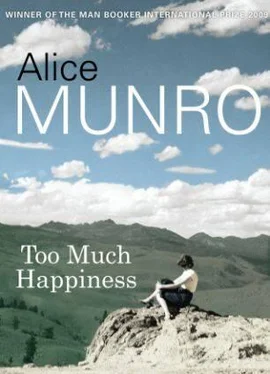He had not known in the beginning, he said. But when she spoke in Russian, he was sure.
“You are the female professor. I have read about you in a journal. There was a photograph as well, but you looked much older in it than you do. I am sorry to intrude on you but I could not help myself.”
“I looked quite stern in the photograph because I think people will not trust me if I smile,” said Sophia. “Is it not something the same for physicians?”
“It may be. I am not accustomed to being photographed.”
Now there was a slight constraint between them; it was up to her to put him at ease. It had been better before he told her. She returned to the subject of Bornholm. It was bold and rugged, he said, not gentle and rolling like Denmark. People came there for the scenery and the clear air. If she should ever wish to come he would be honored to show her around.
“There is the most rare blue rock there,” he said. “It is called blue marble. It is broken up and polished for ladies to wear around the neck. If you would ever like to have one-”
He was talking foolishly because there was something he wanted to say but couldn’t. She could see that.
They were approaching Rostock. He was becoming more and more agitated. She was afraid he would ask her to sign her name on a piece of paper or a book he had with him. It was very seldom that anybody did that, but it always made her feel sad; there was no telling why.
“Please listen to me,” he said. “Something I must say to you. It is not supposed to be spoken of. Please. On your way to Sweden, please do not go to Copenhagen. Do not look frightened, I am completely in my right mind.”
“I am not frightened,” she said. Though she was, a little.
“You must go the other way, by the Danish Islands. Change your ticket in the station.”
“May I ask why? Is there a spell on Copenhagen?”
She was suddenly sure he was going to tell her about a plot, a bomb.
So he was an anarchist?
“There is smallpox in Copenhagen. There is an epidemic. Many people have left the city, but the authorities are trying to keep it quiet. They are afraid of a panic or that some people will burn down the government buildings. The problem is the Finns. People say the Finns brought it. They don’t want the people to rise up against the Finnish refugees. Or against the government for letting them in.”
The train stopped and Sophia stood up, checking her bags.
“Promise me. Do not leave me here without promising me.”
“Very well,” said Sophia. “I promise.”
“You will be taking the ferry to Gedser. I would go with you to change the ticket but I must go on to Rutgen.”
“I promise.”
Was it Vladimir he reminded her of? Vladimir in the early days. Not his features, but his beseeching care for her. His constant humble and stubborn and beseeching care.
He held out his hand and she gave him hers to shake, but that was not his only intention. He placed in her palm a small tablet, saying, “This will give you a little rest if you find the journey tedious.”
I will have to talk to some responsible person about this epidemic of smallpox, she decided.
But that she did not do. The man who changed her ticket was annoyed at having to do anything so complicated and would be even angrier if she changed her mind. He seemed at first to answer to no language except Danish, as spoken by her fellow passengers, but when he finished the transaction with her he said in German that the trip would take a good deal longer now, did she understand that? Then she realized that they were still in Germany and he might know nothing about Copenhagen-what had she been thinking of?
He added gloomily that it was snowing on the islands.
The small German ferry to Gedser was well heated, though you had to sit on wooden slat seats. She was about to swallow the tablet, thinking that seats like these might be what he meant when he spoke of the journey being tedious. Then she decided to save it, in case of seasickness.
The local train she got into had regular though threadbare second-class seats. It was chilly, however, with a smoky almost useless stove at one end of the car.
This conductor was friendlier than the ticket master, and not in so much of a hurry. Understanding that they really were in Danish territory, she asked him in Swedish-which she thought might be closer than German to Danish-whether it was true that there was sickness in Copenhagen. He replied that no, the train she was on did not go to Copenhagen.
The words “train” and “Copenhagen” seemed to be all he knew of Swedish.
In this train there were of course no compartments, only the two coaches with their wooden benches. Some of the passengers had brought their own cushions and their blankets and cloaks to wrap around themselves. They did not look at Sophia, much less try to speak to her. What use would it be if they did? She would not be able to understand or reply.
No tea wagon either. Packages wrapped in oiled paper were being opened, cold sandwiches taken out. Thick slices of bread, sharp-smelling cheese, slabs of cold cooked bacon, somewhere a herring. One woman took a fork out from a pocket in the folds of her clothing and ate pickled cabbage from a jar. That made Sophia think of home, of Russia.
But these are not Russian peasants. None of them are drunk, or garrulous, or laughing. They are stiff as boards. Even the fat that blankets the bones of some of them is stiff fat, self-respecting, Lutheran fat. She knows nothing about them.
But what does she really know about Russian peasants, the peasants at Palibino, when it comes to that? They were always putting on a show for their betters.
Except perhaps the one time, the Sunday when all the serfs and their owners had to go to church to hear the Proclamation read. Afterwards Sophia’s mother was completely broken in spirit and moaned and cried, “Now what will become of us? What will become of my poor children?” The General took her into his study to comfort her. Aniuta sat down to read one of her books, and their little brother Feodor played with his blocks. Sophia wandered about, making her way to the kitchen where house serfs and even many field serfs were eating pancakes and celebrating-but in a rather dignified way, as if it was a saint’s day. An old man whose only job was to sweep the yard laughed and called her Little Missus. “Here’s the Little Missus come to wish us well.” Then some cheered for her. How nice they were, she thought, though she understood that the cheering was some kind of joke.
Soon the governess appeared with a face like a black cloud and took her away.
Afterwards things went on pretty much as usual.
Jaclard had told Aniuta she could never be a true revolutionary, she was only good for getting money out of her criminal parents. As for Sophia and Vladimir (Vladimir who had snatched him away from the police), they were preening parasites, soaking up their worthless studies.
The smell of the cabbage and the herring is making her slightly sick.
At some farther point the train stops and they are all told to get out. At least that is what she assumes, from the conductor’s bark and the heaving up of reluctant but obedient bodies. They find themselves in knee-deep snow, with no town or platform in sight and smooth white hills around them, looming up through what is now lightly falling snow. Ahead of the train men are shovelling away the snow that has collected in a railway cut. Sophia moves around to keep her feet from freezing in their light boots, sufficient for city streets but not here. The other passengers stand still, and pass no comment on the state of affairs.
After half an hour, or perhaps only fifteen minutes, the track is clear and the passengers clamber back onto the train. It must be a mystery to all of them, as to Sophia, why they had to get out in the first place, instead of waiting in their seats, but of course nobody complains. On and on they go, through the dark, and there is something other than snow driving against the windows. A scratching malevolent sound. Sleet.
Читать дальше












